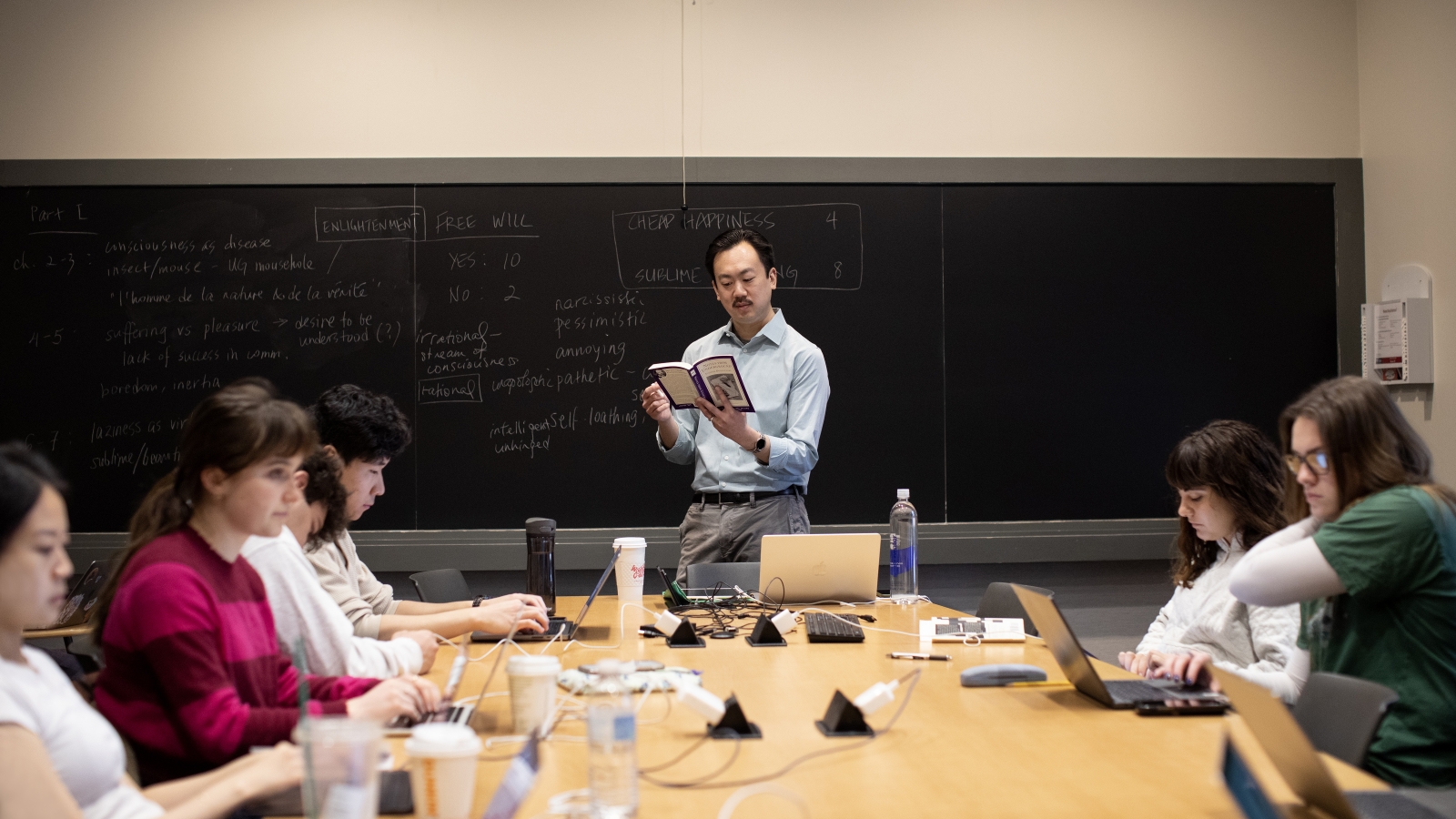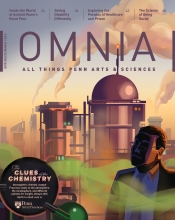When D. Brian Kim arrived at Penn in fall 2018, one of the first undergraduate classes he taught was Russia and the West. He taught it again this spring—amid the most serious geopolitical conflict between Russia and its European neighbors in decades.
An assistant professor in Russian and East European studies (REES), Kim was drawn to Russian studies by a fascination with the language. “I have always been interested in languages,” says Kim, who attended a boarding school in high school where his dorm head was a Russian teacher. “At first I thought, ‘Oh, here’s a cool new alphabet.’ The grammar is really complicated, and it was just this puzzle.”
As Kim studied the language, he immersed himself in Russian literature and culture. He earned a Ph.D. in Slavic languages and literature from Stanford University, and decided to focus his studies on the question of how Russians have related to other peoples throughout history, including Russia’s position between the East and West. “It seemed sometimes to be Europe and sometimes to be Asia, and very often to be neither, depending on who was talking and what their goals were,” he says. “So, ‘Russia and the Other’ is a concise encapsulation, I suppose, of my own interests.”
With the Russian invasion of Ukraine, these questions have taken on greater urgency, and Kim adjusted the course in light of current events. The class began with broad theoretical approaches to the question of where Russia has situated itself, including historical perspectives and more modern ones, before backtracking to provide a historical overview from the 10th to the 20th centuries.
“One of the changes I made was that we spent a very early class looking at Vladimir Putin’s official Kremlin speeches over the past year, starting with the invasion of Ukraine and ending on his New Year’s address of this year,” says Kim.
For students, that drove home that the question of Russia and the West is extremely relevant to this present moment, he says.
The class, which is offered each year, fulfills general education requirements and thus draws from a cross-section of the undergraduate population. Majors such as political science and international relations are well represented, and about a quarter of the students are in the natural sciences.
For Catherine Fantuzzo, C’24, who is double majoring in REES and comparative literature, this class was a natural fit for her interests. “I took this course because of its relationship to the ‘holy trinity’ of Russian literature, history, and international relations historically,” she says.
Students read canonical authors such as Dostoevsky, Tolstoy, and Voltaire, as well as lesser-known works, plays, and travelogues.
Russia and the West
A Reading List
To get a taste of what Penn undergraduates learn and discuss in the course Russia and the West, D. Brian Kim, Assistant Professor of Russian and East European Studies, suggests the following texts:
A History of Russian Thought from the Enlightenment to Marxism
by Andrzej Walicki
A broad overview of the intellectual currents that have gone into the making of Russian identity over the past few centuries.
Winter Notes on Summer Impressions
by Fyodor Dostoevsky
A semi-fictional travelogue from Dostoevsky’s travels in France and Britain in the 1860s.
The Russian Idea
by Nikolai Berdyaev
This early-20th-century text explores the Russian self-conception of having a special destiny or mission and the drive to bring the rest of the world into line with this mission.
One reading that generates interest among students is a four-act play called Woe from Wit by Alexander Griboedov, which portrays Russia on the heels of the Napoleonic wars. “It’s funny, which is always helpful,” says Kim, “and it’s a dramatization of the ways in which Russian society changed coming from the 18th century, when there was an openness to the cultural emulation of Western Europe, and particularly France. In the wake of war with France, that obviously shifts a bit. So, it’s a moment where there is a reckoning in Russian identity, where we start seeing the interest in asking what it really means to be Russian.”
In fact, he says, the course is as much about Russia and itself as it is about Russia and the West, since the West has so often been the mirror against which Russia measures itself.
Fantuzzo was especially struck by learning about the rule of Catherine the Great. “Much of her reign was dedicated to making sure that Russia appeared more Western than it did despotic to Western Europe,” she says. “Up until Peter I and Catherine II, Russia’s international perception as viewed from the Europe of the 1800s was one shrouded in mystery and ‘otherness,’ and Catherine poured her energy into making the Western elements of Russian culture known to the West by incorporating primarily Enlightenment values.”
For this reason, says Fantuzzo, reading Putin’s speeches, followed by learning about Russia’s interactions with Europe over the ensuing centuries, made for a jarring contrast.
Kim says one goal with this class is to have students question the very concepts of Russia and the West. He says, “Over the course of the semester, students come to understand that these are variable categories that can be morphed and shifted to suit the needs of whoever is deploying them at any given time, in any given context.”
Another key point that Kim wants students to understand is the Russian conception of its own exceptionalism, the Russian idea of a Messianic destiny, which he says has had multiple iterations during the past millennium. He thinks this lies at the base of Putin’s justification for the invasion of Ukraine in terms of protecting Russian sovereignty.
“That doesn’t make any sense from our point of view,” Kim says, “if you don’t understand the 1,000 years that led up to the making of these statements and the cultural currents that have gone into the shaping of these narratives.”
Fantuzzo says the literature provides an excellent tool for “adopting the lens by which Russia looks at the West. I am a big proponent of studying literature for this reason. Russian literature is a primary source for understanding the culture and the mind of the people. Everyone at Penn should take this course.”




